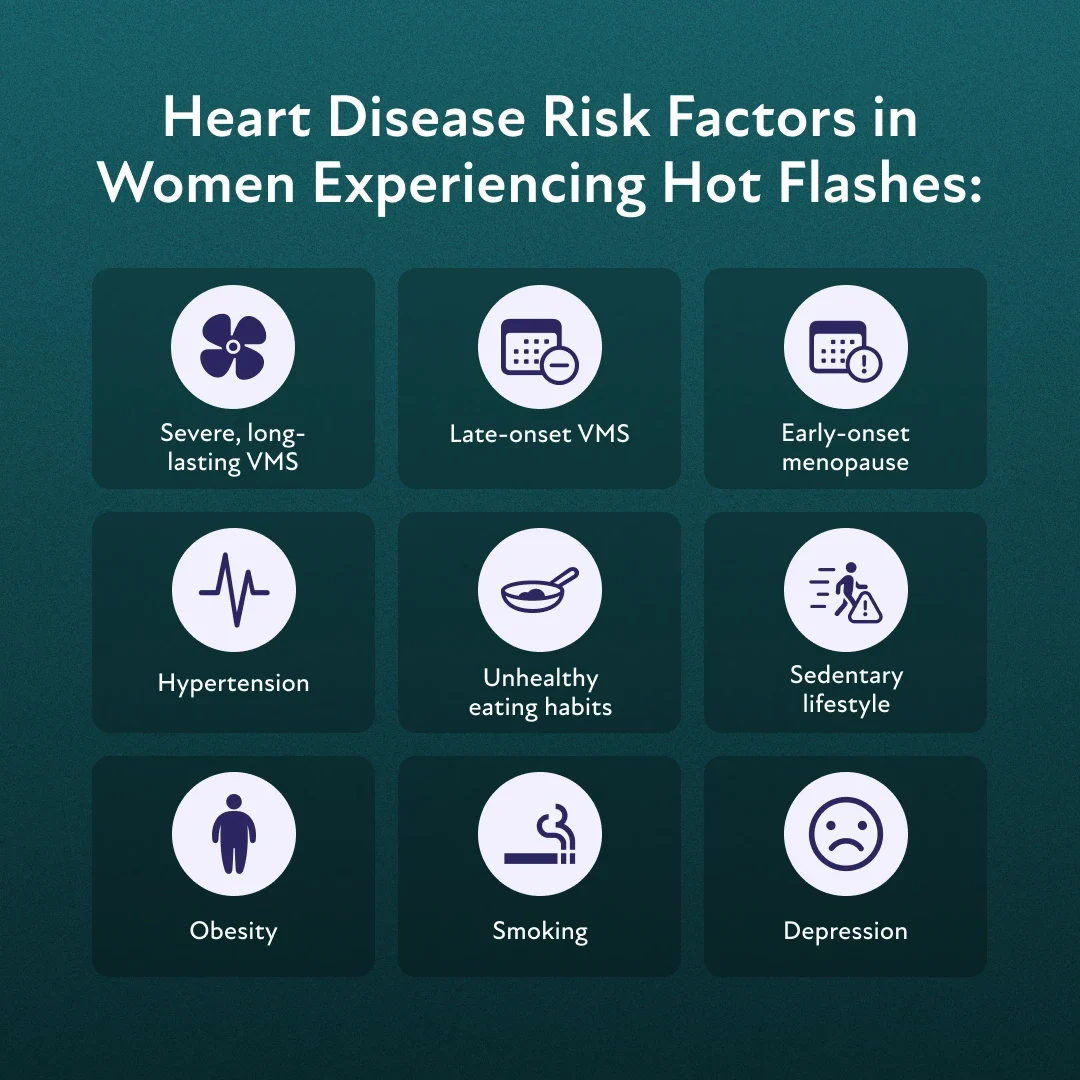Hot flashes are one of the most common vasomotor symptoms (VMS) associated with menopause. Studies show that 75% of women may experience hot flashes at least once during the menopausal transition.(1)
While hot flashes are a common occurrence during menopause, every woman’s experience is unique. For some women, hot flashes are mild, infrequent, and subside within two years. For others, they may be severe, last for five years or longer, and affect their quality of life. Severe hot flashes are believed to increase the risk of heart disease in some women.(2)
Since not every woman with severe hot flashes will develop heart disease, understanding the factors that may increase this risk is crucial. This article explores the potential link between hot flashes and heart disease, identifies the risk factors, and discusses treatment options to help women prevent or manage this risk.
How are hot flashes and heart problems related?
Hot flashes and heart conditions have some common contributors during menopause, particularly low estrogen levels. Estrogen has a protective effect on the heart by maintaining the health and elasticity of blood vessels. The lower prevalence of heart conditions in women compared to men before menopause reflects this beneficial effect of estrogen. However, after menopause, the risk for heart problems evens out, making men and women equally susceptible.
Researchers believe the following changes associated with hot flashes may contribute to the development of heart disease in some women during menopause:(2,3)
Changes in Blood Vessels
Blood vessels are elastic tubes that help transport blood to and from the heart. When these vessels lose their elasticity or become constricted, the heart has to work harder to push blood through them, increasing the risk of heart disease. Women experiencing severe hot flashes may have blood vessels that do not respond appropriately to stress or exercise.
Flow-mediated dilation is when blood vessels relax in response to increased blood flow. Studies indicate that hot flashes may be associated with abnormal flow-mediated dilation, which can contribute to heart disease. Additionally, some women with moderate to severe hot flashes may have constricted or calcified blood vessels.
However, this doesn’t mean every woman experiencing hot flashes will have a heart problem. It just means that some blood vessels may not work as well as they should. Women should consult a physician who can help them understand their risk of developing heart disease and take measures to prevent or manage it.
Metabolic Disorders
Women with severe hot flashes may be more prone to metabolic disorders, such as insulin resistance and high cholesterol levels, which are risk factors for heart disease.
Sleep Disturbances
Severe hot flashes that occur at night, also known as night sweats, can disrupt an individual’s ability to fall asleep or stay asleep. Poor sleep quality is linked to an increased risk of calcified arteries and heart conditions.

Risk Factors of Hot Flashes and Heart Disease
Factors that may increase the risk of heart conditions in women experiencing hot flashes include the following:
Severe, long-lasting VMS
Late-onset VMS, occurring five or more years after menopause
Smoking
Sedentary lifestyle
Unhealthy eating habits
Obesity
Hypertension
Depression
Early onset menopause (before age 45)

How to Prevent Heart Disease in Women
Researchers believe that more than 80% of heart disease cases may be prevented by incorporating the following lifestyle changes:(4)
Eating a healthy diet: A heart-healthy diet consists of fruits, vegetables, grains, lean meats, and low-fat or fat-free dairy products. It also helps to avoid added sugars, saturated or trans fats, and high amounts of salt.
Exercising: Regular physical activity helps maintain a healthy weight, which is crucial for heart health. Experts recommend getting 30 minutes of moderate-intensity activity at least five days a week. Some effective activities include jogging, running, swimming, and cycling.
Managing stress: Stress can negatively impact blood vessel health and contribute to heart disease. Yoga, meditation, and deep breathing exercises can help reduce stress.
Quitting smoking: Smoking can double the risk of heart disease. Quitting smoking and avoiding secondhand smoke can help protect heart health.
Hormone Replacement Therapy (HRT) to Reduce Hot Flashes and Heart Disease
HRT is the gold standard treatment for hot flashes. According to a 2004 review, systemic HRT may reduce the frequency of hot flashes during menopause by 75%.(5) Estrogen-only HRT is the most effective treatment option for managing hot flashes in women who have had a hysterectomy. For women with an intact uterus, doctors generally recommend combined HRT to prevent the risk of endometrial hyperplasia.(5)
Studies also suggest that women who take HRT may have a lower prevalence of heart conditions compared to those who have never taken it. However, the timing of initiating HRT is crucial in determining its effectiveness. Experts recommend starting HRT before any damage occurs to the heart tissue, ideally at the onset of menopause.(6)
Women experiencing severe hot flashes or night sweats should consult a physician early in their menopausal journey. The doctor can evaluate their condition and determine the right course of action to help prevent potential heart complications.